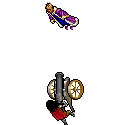|
I'm gonna be pedantic and say that being poor != being impoverished. Talking to Chronicler, who was likely born upper-middle class, it's an apt description - to someone who has always had money, those things are important. It also fits with the environment - poor people don't go to the University, so things like that would absolutely stand out (in the wrong way). Kvothe is trying his absolute damndest to not look like a charity case to his landed friends, and that's hard when you look like a walking ragbag and are that guy that goes to a restaurant and orders the cheapest dish on the menu and a water every time. It's definitely jarring when you think about it in relation to Kvothe in Tarbean, but I'm sorta willing to let it slide because the University is about Kvothe trying to leave behind his street urchin past. Maybe a more relatable example - it's like going to public school in a nice area and being the one kid with dirty secondhand kmart clothes while all your friends have brand new name brand clothing.
|
|
|
|
|

|
| # ? May 23, 2024 16:07 |
|
I like to think I'm pretty sensitive to rhythm and syncopation in prose for an amateur, and yeah, Rothfuss' stuff really is just like hitting Middle "C" for paragraphs at a time. I've always pointed to Blake Butler as a great example of harsh "burnt tongue" prose but the guy's also kind of unpleasant and vanished totally up his own rear end after his first book ("Scorch Atlas," if anyone's interested). The last section of his short story "We Witnessed the Advent of a New Apocalypse During an Episode of Friends" was one of the more haunting passages I read that year. ChickenWing posted:I'm gonna be pedantic and say that being poor != being impoverished. The text refers to this situation as being "truly poor." This has nothing to do with pedantry and everything to do with Rothfuss having no clue what poverty is like.
|
|
|
|
TheIncredulousHulk posted:
It's a very specific level of poverty. Kvothe isn't poor enough that he can't go out, but he can't buy salt. Patrick Rothfuss posted:First, I was driven. Other students could afford to stroll through their studies. Their parents or patrons would cover the expense. I, on the other hand, needed to climb the ranks in the Fishery quickly so I could earn money working on my own projects. Tuition wasn’t even my first priority anymore, Devi was. I also don't buy that everyone else is just a dilettante aristocrat who can afford to spend forever getting their degree at Magic University. Surely the people paying for this education are pushing the students to get done reasonably quickly to reduce expenses? I'm sure some students gently caress around, but wouldn't many feel a sense of obligation to finish on time? Especially if they're being sponsored by a patron, in which case the patron would presumably be looking for a return on their investment in the student.
|
|
|
|
Grenrow posted:The salt bit in that last quote is kind of weird. I think you'd be more worried about having food to begin with rather than flavoring. Salt's not even a particularly expensive commodity. I think Rothfuss heard somewhere that back in Ye Olden Days, salt was "valuable," but he never bothered to read any proper history, so he doesn't understand why. Salt was valuable because it was a great trade good: you could gather it in bulk relatively easily, you can move it around fairly easily, and you can sell it practically anywhere. But it wasn't usually something expensive or considered a luxury. If you can afford meals at all, you can probably afford salt, barring environmental constraints (I think some parts of west/central Africa had really high prices for salt in the 18th century?). Besides, Kvothe is presumably not buying salt in massive quantities so he can use it for preparing food for winter or salting his daily catch of fish. He's just cooking with it and maybe adding some to his regular meals. This is a really pedantic point to be going on about, but it's just such a dumb, bullshit detail. Much like music, I don't think Rothfuss actually has any experience with living in poverty. If Kvothe hadn't spent years living as a loving beggar the Harry Poverty poo poo might be slightly less awful.
|
|
|
|
Do you people just read the end of the posts
|
|
|
|
Oxxidation and BotL - I'm an uncultured barbarian who thinks hating WoT makes him an intellectual - can you point me to some prose with a good rhythm for comparison? Or a link to an earlier post if I missed you talking about it.
|
|
|
|
Strom Cuzewon posted:Oxxidation and BotL - I'm an uncultured barbarian who thinks hating WoT makes him an intellectual - can you point me to some prose with a good rhythm for comparison? Or a link to an earlier post if I missed you talking about it. I namedropped Blake Butler in my last post, though I dunno if I'd call him "good" so much as "excessively weird." An excerpt from his short "The Disappeared": quote:Before prison, Dad had sat at night with his cell phone on his knee on vibrate, waiting to feel the pulse shoot up his leg and hear her on the other end, alive. His skin would flex at any tremor. The phone rang through the night. The loan folks wanted back their money. Taxes. Electricity. They would not accept Visa or good will. Dad developed a tic and cursed with no control. He believed my mother's return in his heart. His list of sightings riddled the whole map. He thought he'd heard her once in the men's room at the movies. Once he'd seen her standing at the edge of a tobacco billboard, pointing down. He wanted me to keep tabs on all these places. As well, he wanted farther acres combed. Mom had been appearing in his sleep. She would not be hard to find if he truly loved her, he said she whispered. You should already know by now. On his skin, while in his cell bed, he made lists of the places where he should have looked: that spot in the ocean where he'd first kissed her; the small plot where they'd meant one day to be buried side by side; behind the moon where they joked they'd live forever; in places no one else can name. He wanted a full handwritten report of each location. Note how much of the passage is chopped into short, declarative sentences, with a lot of hard consonant sounds to make sure every statement snaps cleanly off from the next. There are very few participles, too (-ing words, basically), which lends finality to every action. As the search becomes more futile, the paragraphs themselves grow choppier, and the vocabulary begins to degrade into burnt-tongue strangeness ("thick with buzz," "wreathes of spore"). A similar thing is done with that passage of "Shalimar the Clown" i linked earlier, which uses shorter sentences to simultaneously detach and emphasize brutal actions and longer, more florid ones to uplift the tone in the end. Cormac McCarthy's another popular choice for effective, unusual syncopation, often going for breathless and lengthy sentences without commas or other participles that gives his prose an almost Biblical inevitability even when he's talking about dudes illicitly loving melons. Structure tells story just as much as the words themselves. From what I'm seeing, Rothfuss gives very little thought to that - it's all just "and this happened, then this happened, and this happened while I'm doing this" for pages on end.
|
|
|
|
BravestOfTheLamps posted:Do you people just read the end of the posts Unironically yes.
|
|
|
|
Strom Cuzewon posted:Oxxidation and BotL - I'm an uncultured barbarian who thinks hating WoT makes him an intellectual - can you point me to some prose with a good rhythm for comparison? Or a link to an earlier post if I missed you talking about it. Well that's kind of a broad question, because any competently written novel should have good rhythm to its prose. It's a pretty loose concept in itself, but prose should be "paced" to match the desired effect. The closest novel in reach is Barry Lyndon by William Thackeray. I'll grab that and open page 193: quote:How were times changed with me now! I had left my country a poor penniless boy—a private soldier in a miserable marching regiment. I returned an accomplished man, with property to the amount of five thousand guineas in my possession, with a splendid wardrobe and jewel-case worth two thousand more; having mingled in all the scenes of life a not undistinguished actor in them; having shared in war and in love; having by my own genius and energy won my way from poverty and obscurity to competence and splendour. As I looked out from my chariot windows as it rolled along over the bleak bare roads, by the miserable cabins of the peasantry, who came out in their rags to stare as the splendid equipage passed, and huzza'd for his Lordship's honour as they saw the magnificent stranger in the superb gilded vehicle, my huge body-servant Fritz lolling behind with curling moustaches and long queue, his green livery barred with silver lace, I could not help thinking of myself with considerable complacency, and thanking my stars that had endowed me with so many good qualities. It's nothing exceptional, but it's good at illustrating that the narrator is a complete tosser. Like any self-respecting 19th century author, Thackery writes in long, interminable sentences that convey stateliness and complexity of thought. What Thackery does is express the pretensions of his hero - every phrase is both pointed and deflating. "A poor penniless boy—a private soldier in a miserable marching regiment" is as arduous as the story it tells, long and full of harsh sounds. "I returned an accomplished man" is a great counterpoint, because despite all its puffed-up pride, it's a rather meager statement, like everything that follows it. "As I looked out from my chariot windows at is rolled along over the bleak bare roads, by the miserable cabins of the peasantry..." - The sentence follows Barry Lyndon's train of thought neatly while characterising him: he observes the ridiculous reality of poverty, completely unlike the "humble" beginnings of his self-mythologized past, and then retreats into his luxuries and finally returns to circle his ego. BravestOfTheLamps fucked around with this message at 11:36 on May 6, 2016 |
|
|
|
This thread reminded me to read some more Umberto Eco, so I checked out Baudolino, and it's surprising how many parallels there are. Except for sympathy, but that was already in This Island of the Day Before. The major difference is that Rothfuss writes like a precocious teenager who thinks he knows everything, while Eco writes like a history professor who's spent his life learning things. It doesn't make Eco the easiest to read since he'll casually introduce an argument between a half dozen different religious philosophies on a page, but his details never seems off the way that Rothfuss's details tend to. Just to throw more good prose out there, two random selections from authors commonly acclaimed for prose and rhythm, since I think if a writer is actually good you should be able to just open a book to any page: Vladimir Nabokov in Lolita posted:I think I had better describe her right away, to get it over with. The poor lady was in her middle thirties, she had a shiny forehead, plucked eyebrows and quite simple but not unattractive features of a type that may be defined as a weak solution of Marlene Dietrich. Patting her bronze-brown bun, she led me into the parlor and we talked for a minute about the McCoo fire and the privilege of living in Ramsdale. Her very wide-set sea-green eyes had a funny way of traveling all over you, carefully avoiding your own eyes. Her smile was but a quizzical jerk of one eyebrow; and uncoiling herself from the sofa as she talked, she kept making spasmodic dashes at three ashtrays and the near fender (where lay the brown core of an apple); whereupon she would sink back again, one leg folded under her. She was, obviously, one of those women whose polished words may reflect a book club or bridge club, or any other deadly conventionality, but never her soul; women who are completely devoid of humor; women utterly indifferent at heart to the dozen or so possible subjects of a parlor conversation, but very particular about the rules of such conversations, through the sunny cellophane of which not very appetizing frustrations can be readily distinguished. I was perfectly aware that if by any wild chance I became her lodger, she would methodically proceed to do in regard to me what taking a lodger probably meant to her all along, and I would again be enmeshed in one of those tedious affairs I knew so well. Cormac McCarthy in Blood Meridian posted:They crested the mountain at sunset and they could see for miles. An immense lake lay below them with the distant blue mountains standing in the windless span of water and the shape of a soaring hawk and trees that shimmered in the heat and a distant city very white against the blue and shaded hills. They sat and watched. They saw the sun drop under the jagged rim of the earth to the west and they saw it flare behind the mountains and they saw the face of the lake darken and the shape of the city dissolve upon it. They slept among the rocks face up like dead men and in the morning when they rose there was no city and no trees and no lake only a barren dusty plain. Some people praise Rothfuss's prose, but I suspect it's because he sometimes decides to be clever with analogies, dissonant adjectives, or insights on life. (I find them all those things the most annoying part of his books, but who am I to judge). His simple writing also makes it easier to read much faster, which is a benefit because he writes so many words. Incidentally both Humbert Humbert and the kid are thoroughly unlikeable protagonists, but unlike Kvothe, they manage to be compelling despite it.
|
|
|
|
Talking about structure, William Gibson's "The Peripheral" has over 100 chapters and it rules.
|
|
|
|
LET'S READ THE KINGKILLER CHRONICLE CRITICALLY Interlude - Umberto Eco's Comic Portrait of Life in a Pre-Modern University quote:Mostly the students played ball, true, but they also brawled with the people of the Abbey of Saint Germain, or among students of different origin, Picards against Normans, for example, and they traded insults in Latin, so that anyone could understand you were offending him. These were all things frowned upon by the Great Provost, who sent his bowmen to arrest the most unruly. Obviously, at this point the students forgot their differences and all together fell to exchanging blows with the bowmen. - Umberto Eco, Baudolino BravestOfTheLamps fucked around with this message at 17:02 on May 6, 2016 |
|
|
|
While I can see that the prose is definitely elevated a couple levels beyond Rothfuss's, it seems almost stuffy to me, to the point that I'm not sure I'd actually enjoy reading an entire book of it. Hell, my eyes glossed over a couple times in just those paragraphs. It's one thing to be able to put words together nicely, it's another entirely to make them captivating.
|
|
|
|
|
ChickenWing posted:While I can see that the prose is definitely elevated a couple levels beyond Rothfuss's, it seems almost stuffy to me, to the point that I'm not sure I'd actually enjoy reading an entire book of it. Hell, my eyes glossed over a couple times in just those paragraphs. Eco is a semiotics professor first and a novelist second, so yes, his writing does tend to sound like an academic essay. I think one of the most important things to take from that passage in comparison to Rothfuss is that Niketas is openly incredulous when Baudolino goes into all the shenanigans he got up to during his university years, leaving Baudolino to defend himself and lend further depth to his passage, unlike Kvothe, who just spits out a petulant "you don't know what it's like" and gets back to aggrandizing himself. Unlike the Chronicler, who's pretty much just a sounding board for Kvothe's bullshit (he's not even given the decency of a name), Niketas is much more interrogatory for the initial bits of Baudolino's story, and doesn't even let him wriggle away from accusations that he's making it all up. At one point Baudolino does the whole "oh I'm not really all that important, just in the background of major events, that's how I like it" thing and Niketas immediately (and rightly) calls out his false modesty as further evidence of his hubris.
|
|
|
Oxxidation posted:Eco is a semiotics professor first and a novelist second, so yes, his writing does tend to sound like an academic essay. Chronicler actually does have a name, but unfortunately it's remaining firmly stuck to the tip of my tongue. (e: Devon Lochees) I can see what you mean regarding Chronicler's lack of input, but I'm not convinced it would necessarily make things better. Perhaps that's just because I'm comfortable with the book as-is, but I feel like more interjections would be jarring and break the flow (which I feel the book has in earnest).
|
|
|
|
|
ChickenWing posted:Chronicler actually does have a name, but unfortunately it's remaining firmly stuck to the tip of my tongue. (e: Devon Lochees) The flow consists of Kvothe jacking himself off without cessation or interruption so I'd be pretty okay with that being broken. I seriously can't get over what a repellent little poo poo he is, and all the more because everything about the story suggests we're supposed to root for him. Conversely, Baudolino's glory is spread out over a whole cast of characters, and he makes it clear from the start that his only really noteworthy skill is lying his rear end off (which immediately makes his whole story suspect, of course).
|
|
|
|
Oxxidation posted:The flow consists of Kvothe jacking himself off without cessation or interruption You know nothing Jon Snow At least until the next entry.
|
|
|
|
LET’S READ THE KINGKILLER CHRONICLE CRITICALLY Part 23: “Slowly, I realized that none of this mattered.“ Before we discuss the story, let’s work through some huge blocks of text. Chapter 53, “Slow Circles,” opens with narration that once again serves as a good example of the unimaginative evenness of the tone. It has everything already mentioned: the stretched-out limpness of thelim sentences, the overtly smooth flow of sentences, and the flat note to conclude things. quote:There were a lot of places you could go in Imre to listen to music. In fact, nearly every inn, tavern, and boarding house had some manner of musician strumming, singing, or piping in the background. But the Eolian was different. It hosted the best musicians in the city. If you knew good music from bad, you knew the Eolian had the best. Just for some variety, look at how Eco introduces an outlandish character in the transition from the framing story to the main narrative: Baudolino posted:Baudolino had been able to read many books with Otto, but he hadn't realized that there could exist as many in the world as there were in Paris. They were not at everyone's disposal, but through good luck, or, rather, through good attendance at his lessons, he had come to know Abdul. Notice how unique this character is despite being nominally mundane. Just some food for thought. As for the rest of the chapter, Kvothe has also found an audience for his practice. This is Auri, a child-like young woman who hides in the abandoned depths of the university. She and Kvothe struck up a correspondence off the page. She’s a fairly significant character, too, so this is more important than for the sheer dreadfulness of it all. She lives somewhere beneath the University, which will be more important later. quote:I headed to my bunk and retrieved my lute from the trunk at the foot of the bed. Then, given the rumors Sim had mentioned, I took one of the trickier ways onto the roof of Mains, shimmying up a series of drainpipes in a sheltered box alley. I didn’t want to draw any extra attention to my nighttime activities there. This is of course a terrible storytelling choice, because her introduction is robbed of any intrigue and mystery. The focus is instead on her being a precious eccentric. This may seem a bit incongruous, but I glossed over the scene that introduced the University’s asylum and the obligatory screaming lunatics therein. Part 20, Chapter 46, if you’re curious. Auri is deranged in a beautifully damaged way that tempts the reader to search for a fitting entry on TvTropes. She’s kin to eccentrics like Elodin, who she’s seen talking with the wind on rooftops at night. Oddly enough, despite Kvothe’s patronizing attitude towards her (contradictory given his age), theirs is one of the few relationships between equals in the book. It’s still not very good. On one hand it’s simply a given that Kvothe knows how to indulge her eccentricities, which robs it of authenticity, and on the other because it’s just so loving twee. And remember, Kvothe is still fifteen, despite acting like he was in his twenties like the scenes imply. quote:She smiled and thrust her hand forward. Something gleamed in the moonlight. “A key,” she said proudly, pressing it on me. quote:While I was trying to make sense of what she’d said, Auri finished the last of her bread and clapped her hands excitedly. “Now play!” she said breathlessly. “Play! Play!” We leave off with that. Chapter 54, “A Place to Burn,” cuts to Kvothe and his interchangeable friends making their way to the Eolian. He unwittingly wins over the owner of the place, who he mistakes for a doorman. Kvothe is just one of the musicians going for “the pipes,” and he intends to play an extremely difficult and complex duet with a volunteer from the audience. While the company is drinking, Ambrose happens to enter the Eolian. Turns out he has tried performing before by reciting poetry. There’s also dialogue about drinking to waste page or two. There are other performers, including wealthy but talentless dilettante Count Threpe. It’s finally Kvothe’s turn to play, and... You know what’s going to happen. We’ve seen this before. Chapter 34: quote:Then I felt something inside me break and music began to pour out into the quiet. My fingers danced; intricate and quick they spun something gossamer and tremulous into the circle of light our fire had made. The music moved like a spiderweb stirred by a gentle breath, it changed like a leaf twisting as it falls to the ground, and it felt like three years Waterside in Tarbean, with a hollowness inside you and hands that ached from the bitter cold. Expect overblown metaphors and similes. Kvothe of course turns out to be mesmerizing, especially when complemented by the unknown volunteer in the audience. Mid-performance, however, a string breaks on his lute, but he powers on through. In the end, his performance is so powerful that he himself is crying. quote:The lights shining onto the stage made the rest of the room dim from where I sat. Looking out I saw what seemed to be a thousand eyes. Simmon and Wilem, Stanchion by the bar. Deoch by the door. I felt a vague flutter in my stomach as I saw Ambrose watching me with all the menace of a smoldering coal. quote:It was not perfect. No song as complex as “Sir Savien” can be played perfectly on six strings instead of seven. But it was whole, and as I played the audience sighed, stirred, and slowly fell back under the spell that I had made for them. As conflict, it's mechanical, and as prose, it's suffocating. What is there to be said that hasn’t been said before? Perhaps nothing more than that combined with the next two chapters, this might be the peak of Kvothe’s non-ironic self-aggrandizement. I don’t recall there being anything quite as self-absorbed as this afterwards. Of course, this only applies to The Name of the Wind. Chapter 55, “Flame and Thunder,” is the shortest yet, and is just an addendum to his performance. I quote it in full: quote:I held all of my mourning for Savien and Aloine to a few moments. JUST ROTHFUSS THINGS quote:“What?” I asked. “The thing with the doorman? Simmon, you are jittery as a teenage whore. He was friendly. I liked him. What’s the harm in offering him a drink?” quote:The next to try her talent was a young woman, richly dressed with golden hair. After Stanchion introduced her, she sang an aria in a voice so clear and pure that I forgot my anxiety for a while and was ensnared by her song. [...] BravestOfTheLamps fucked around with this message at 02:31 on Jan 16, 2017 |
|
|
|
I believe this is where I metaphorically threw the book in the trash.
|
|
|
|
quote:I heard a rustle from the hedges below and then saw Auri scamper up the tree like a squirrel. She ran around the edge of the roof, then pulled up short a few dozen feet away. This single sentance, injected into the narrative is interestingly at contrast to the rest of the passage. It's all descriptive of Auri, but breaks in to the authors voice, and then returns to description. In the descriptions of Auri we read; her physicality, her language and her behaviour, they are all those of a child/non-adult. But, within 2 sentances of introducting the character, Rothfuss/Kvothe feels it necessary to interject, and say, "No, no, she's totally legal, in fact, she was older than me!". I do wonder if it was the editor, or his own good sense that told him to add that line?
|
|
|
|
Trammel posted:This single sentance, injected into the narrative is interestingly at contrast to the rest of the passage. It's all descriptive of Auri, but breaks in to the authors voice, and then returns to description. In the descriptions of Auri we read; her physicality, her language and her behaviour, they are all those of a child/non-adult. But, within 2 sentances of introducting the character, Rothfuss/Kvothe feels it necessary to interject, and say, "No, no, she's totally legal, in fact, she was older than me!". I do wonder if it was the editor, or his own good sense that told him to add that line? Rothfuss does not appear to have good sense if the legends about book 2 are true. I'm guessing editor.
|
|
|
|
HIJK posted:Rothfuss does not appear to have good sense if the legends about book 2 are true. I'm guessing editor.
|
|
|
|
Nakar posted:Legends about what, the editing process on the publisher's end? There's probably a lot of dirty laundry I'd love to hear about from publishers on a lot of things. I've never read book 2, so everything I know about the sex ninjas and the sex fairy is apocrypha/legendary. I don't have any stories about the editing process though I wish I did.
|
|
|
I continue to be completely and utterly confused by what you lot find unlikable.Trammel posted:This single sentance, injected into the narrative is interestingly at contrast to the rest of the passage. It's all descriptive of Auri, but breaks in to the authors voice, and then returns to description. In the descriptions of Auri we read; her physicality, her language and her behaviour, they are all those of a child/non-adult. But, within 2 sentances of introducting the character, Rothfuss/Kvothe feels it necessary to interject, and say, "No, no, she's totally legal, in fact, she was older than me!". I do wonder if it was the editor, or his own good sense that told him to add that line? Huh? Why is this important? Is age not a normal part of descriptions?
|
|
|
|
|
Yeah, it's nothing compared toquote:Though in my heart I thought of her as my little moon-fey.
|
|
|
|
Rothfuss has weird ideas of what it means to be a man.
|
|
|
|
ChickenWing posted:I continue to be completely and utterly confused by what you lot find unlikable. Some people find it creepy to simultaneously infantalize a grown woman while also sexualizing someone who is mentally like a child.
|
|
|
|
Auri, who is consistently written like a nine-year-old, is also implied to be a rape victim. But we're also told that that's a good thing, because being raped made her a special snowflake, so all's well that ends well.
|
|
|
|
^ ^ ^ ^ ^ ^ e: (Had the reply window up for awhile.)Oh, christ, I forgot about that. Okay, yeah, that's a bit weird. Wait, did I miss something? I don't remember Auri ever having been sexualized. Hell, I even forgot that she was supposed to be older than him. I've always thought that he interactions with Kvothe were cute, and was expecting a lot more from Slow Regard. If you folks who like Rothfuss want to see why people might think he's a bad writer, read Slow Regard of Silent Things.
|
|
|
Dienes posted:Some people find it creepy to simultaneously infantalize a grown woman while also sexualizing someone who is mentally like a child. Yeah I never got this. There's nothing that evokes any sort of sexual feelings towards Auri at all. Lottery of Babylon posted:Auri, who is consistently written like a nine-year-old, is also implied to be a rape victim. But we're also told that that's a good thing, because being raped made her a special snowflake, so all's well that ends well. Again, that's not how it came across to me at all. It's mentioned multiple times throughout the book that students sometimes have mental breaks as a result of sympathy or not washing their hands between alchemy and dinner or whatever and Auri is fairly obviously put up as an example of this. SpacePig posted:If you folks who like Rothfuss want to see why people might think he's a bad writer, read Slow Regard of Silent Things. It's me I'm the goon who liked the Bad Book. I really enjoyed how it fleshed out Auri and made me enjoy her character that little bit more.
|
|
|
|
|
Ban this sick filth. Surely not even Jivjov would go this far.
|
|
|
|
Calm down, Number Ten Cocks, you're as jittery as a teenage whore.
|
|
|
|
ChickenWing posted:It's me I'm the goon who liked the Bad Book. I really enjoyed how it fleshed out Auri and made me enjoy her character that little bit more. I felt this way about it in the beginning, and then it just kind of kept going. It felt 3 times longer than it actually was or needed to be. Slow Regard is something that would've been better served as a standalone graphic novel or something.
|
|
|
SpacePig posted:I felt this way about it in the beginning, and then it just kind of kept going. It felt 3 times longer than it actually was or needed to be. Slow Regard is something that would've been better served as a standalone graphic novel or something. I'll admit that I didn't like it as much as NotW or WMF, but I still got really caught up in it. I dunno. Clearly my good-dar is broken.
|
|
|
|
|
ChickenWing posted:I'll admit that I didn't like it as much as NotW or WMF, but I still got really caught up in it. I dunno. Clearly my good-dar is broken. I'm not trying to tell you you're wrong for liking it or anything. Hell, I've defended jivjov here in the past. I guess I'm phrasing things a bit argumentatively lately.
|
|
|
|
Number Ten Cocks posted:Ban this sick filth. Surely not even Jivjov would go this far. The leading 'j' in jivjov is not capitalized. It's a branding thing.
|
|
|
SpacePig posted:I'm not trying to tell you you're wrong for liking it or anything. Hell, I've defended jivjov here in the past. I guess I'm phrasing things a bit argumentatively lately. No you're fine, I was joking because even in this thread most people didn't like Slow Regard.
|
|
|
|
|
ChickenWing posted:No you're fine, I was joking because even in this thread most people didn't like Slow Regard. There's only so many ways you can give quirky human traits to inanimate objects before it gets boring.
|
|
|
|
Dienes posted:There's only so many ways you can give quirky human traits to inanimate objects before it gets boring. The Twelve was one of the rare changing places of the Underthing. It was wise enough to know itself, and brave enough to be itself, and wild enough to change itself while somehow staying altogether true.
|
|
|
|

|
| # ? May 23, 2024 16:07 |
|
jivjov posted:The leading 'j' in jivjov is not capitalized. Is brand positioning that important in the bed-wetting anime pervert space? Maybe it's more crowded than I knew.
|
|
|





















